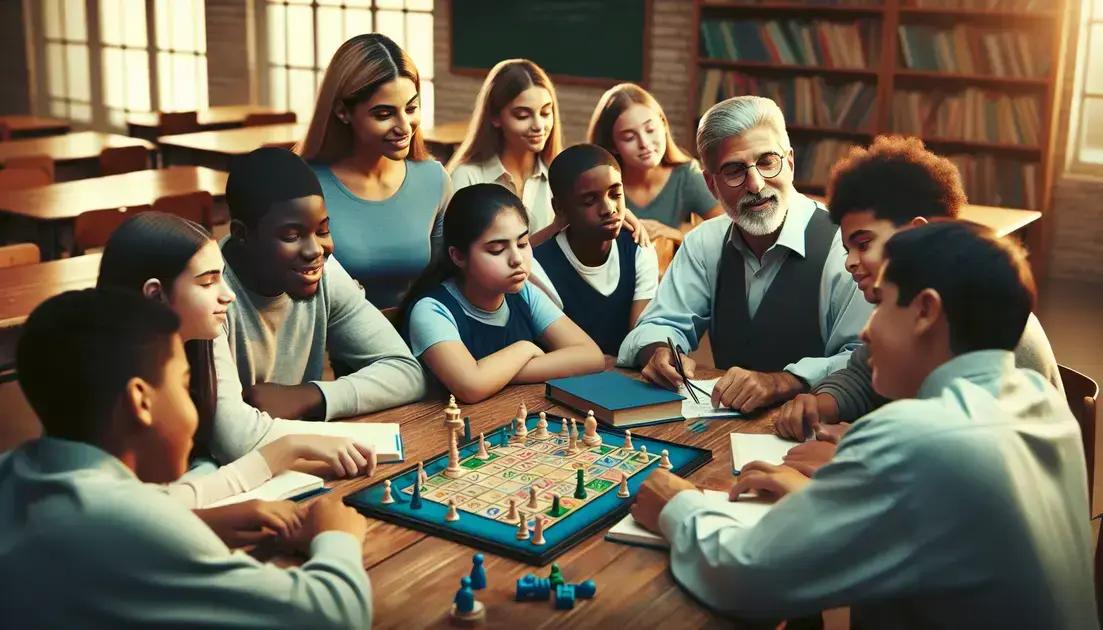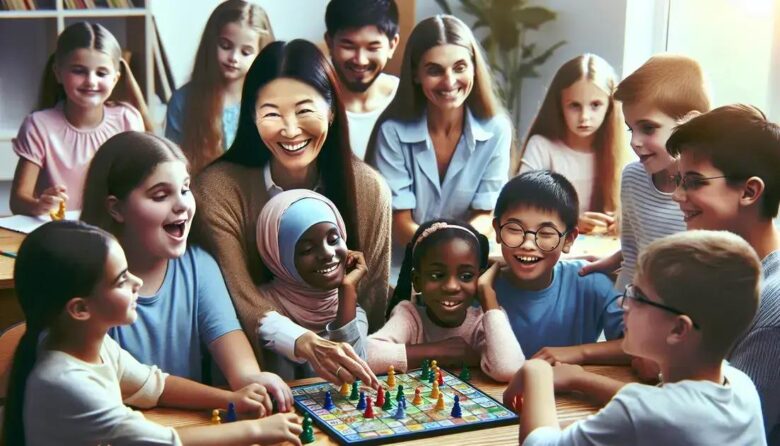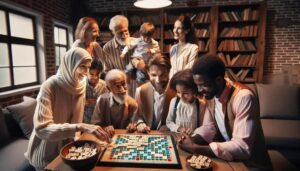Board games for special education teaching enhance learning by developing communication, social skills, and cognitive abilities through interactive, adaptable, and inclusive play.
Have you ever wondered how board games for special education teaching can transform learning? They’re not just fun — these games open doors to interaction, focus, and skill-building in ways traditional methods sometimes can’t.
benefits of board games in special education
Board games offer numerous benefits in special education, making learning enjoyable and effective. They help develop critical thinking, problem-solving, and social interaction skills, which are essential for students with special needs. Playing board games encourages patience and turn-taking, fostering emotional regulation in a supportive environment.
Moreover, these games improve communication by providing opportunities for students to practice verbal and nonverbal skills. Many board games are designed to engage multiple senses, enhancing cognitive development and memory retention. The interactive nature of board games helps maintain attention and motivation, which can be challenging in traditional classroom settings.
In addition, board games promote teamwork and cooperation, allowing students to build confidence as they achieve goals together. Overall, integrating board games into special education supports both academic and social growth while creating a fun and inclusive learning atmosphere.
choosing the right games for different needs
Choosing the right board games for special education teaching requires understanding the unique needs and abilities of each student. Consider games that match students’ cognitive levels and encourage areas they need to develop, such as communication, motor skills, or social interaction.
Assessment of individual learning goals helps in selecting games that are both challenging and accessible. Games with simple rules and clear objectives work well for beginners, while more complex games can benefit students ready for advanced critical thinking.
Games that can be easily adapted or customized offer flexibility to address various learning styles and disabilities. For example, tactile pieces help students with visual impairments, while visual aids and large print cards assist those with reading difficulties.
It’s also important to consider the social aspects of the games, picking those that foster cooperation, turn-taking, and communication. Selecting games that promote engagement and encouragement will help maintain motivation and positive classroom dynamics.
adapting game rules for accessibility
Adapting game rules for accessibility is essential to ensure all students can participate and benefit from board games in special education. Simplifying instructions or breaking them into smaller steps helps students follow along without feeling overwhelmed. Using visual aids, such as picture cards or color-coded pieces, can clarify actions and rules.
Games can also be modified by adjusting the pace, allowing more time for decision-making or removing complex elements that may cause frustration. For example, you might reduce the number of moves required to win or allow cooperative play instead of competition to encourage teamwork.
Physical adaptations might include using larger pieces for students with fine motor challenges or tactile components for those with visual impairments. Listening to student feedback and observing their interactions during gameplay helps teachers make ongoing adjustments.
This flexibility makes games more inclusive and keeps learning positive and effective for every student.
using games to improve communication skills

Using board games to improve communication skills in special education encourages students to express themselves in a safe and interactive setting. Many games require players to describe actions, ask questions, or explain strategies, which naturally promotes verbal practice and listening skills.
Turn-taking and following directions during gameplay help students develop patience and attentive listening. For non-verbal students, games with visual cues and gestures can foster alternative communication methods.
Group games create opportunities for peer interaction, enhancing social communication and building connections. Teachers can guide conversations and model appropriate responses, encouraging students to use new vocabulary and sentence structures.
Incorporating role-playing elements or storytelling within games further supports language development and confidence in communication. This approach transforms learning into an engaging experience that benefits both expressive and receptive communication abilities.
incorporating board games into lesson plans
Incorporating board games into lesson plans can enhance engagement and reinforce learning objectives in special education. Begin by aligning games with specific skills or topics you want to teach, such as math, language, or social skills.
Design your lesson plan to include clear instructions on how games fit into the broader learning goals. For example, use a counting board game to practice addition or a storytelling game to encourage creative language use.
Balance game time with discussion and reflection. After playing, encourage students to talk about what they learned or how they solved problems during the game. This helps connect play to real-world skills.
Plan for flexibility by selecting games that allow rule modifications to suit different learning levels. Integrate visual schedules and checklists to guide students through game steps, supporting focus and independence.
Using board games as part of regular lesson plans not only makes learning fun but also supports varied learning needs with hands-on, interactive methods.
measuring progress through gameplay
Measuring progress through gameplay involves observing and documenting students’ skills development while they engage with board games. Teachers can use checklists or simple rating scales to track improvements in areas like attention span, social interaction, and problem-solving.
Set clear goals before gameplay to focus on specific skills. For example, note if a student follows game rules consistently or communicates effectively with peers during the activity.
Regularly reviewing game sessions helps identify patterns and areas that may need extra support or adjustment. Video recordings or anecdotal notes can provide valuable insights for personalized teaching plans.
Feedback from students about their experiences also adds meaningful data, helping teachers understand engagement levels and motivation. Combining these methods creates a well-rounded approach to assessing growth in a fun, low-pressure environment.
tips for engaging students with special needs
Engaging students with special needs through board games requires thoughtful strategies that focus on inclusion and motivation. Start by choosing games that are age-appropriate and align with each student’s interests and abilities to maintain their attention and excitement.
Use positive reinforcement to encourage participation and celebrate achievements, no matter how small. This helps build confidence and a positive attitude toward learning.
Modify game setups or rules to provide extra support, such as offering visual instructions or allowing additional time to complete moves. Group games that promote collaboration can also foster social skills and peer interaction.
Break activities into manageable segments to prevent overwhelm and allow for frequent breaks if needed. Being flexible and patient creates a supportive environment where students feel safe to explore and learn.
Lastly, involve students in choosing games and developing rules, giving them a sense of control and ownership, which boosts engagement and motivation.
Why board games matter in special education
Board games are a powerful tool that makes learning fun and engaging for students with special needs. They help develop essential skills like communication, social interaction, and problem-solving in a relaxed setting.
By choosing the right games and adapting them for accessibility, teachers can create inclusive lessons that motivate and inspire. Measuring progress through gameplay ensures that learning goals are met while keeping students excited to participate.
With thoughtful planning and support, board games can transform special education and open new doors for student growth and confidence.




